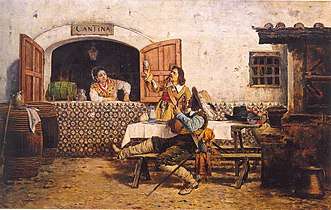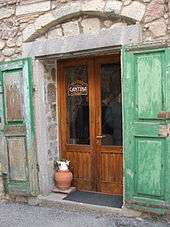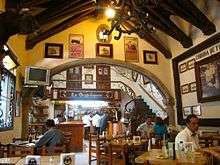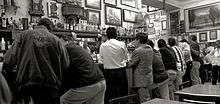Cantina
A cantina is a type of bar common in Latin America and Spain. The word is similar in etymology to "canteen", and is derived from the Italian word for a cellar, winery, or vault.[1] In Italy, the word cantina refers to a room below the ground level where wine and other products such as salami are stored.[2]

As cantine it was used to refer to the shop of a sutler, an army camp follower.
Types of cantinas

Spain
In Spain, a cantina is a bar located in a train station or any establishment located at or near a workplace where food and drinks are served.
Cantina was one of the foreign words that entered in from Renaissance Italy. During the 16th century, the Spanish Empire included large holdings in Italy.[3] Luis de Bávia wrote in his Tercera y Cuarta Parte de la Historia Pontifical y Católica (1621): "Perdiéndose en las cantinas y lugares baxos [sic] gran número de mercaderías..." ("Losing itself in the cantinas and places of ill repute a large quantity of merchandise...").[4]
The cantina features in one of the sonnets of Francisco de Quevedo (1580-1645). This is a quatrain from that sonnet:
Esta cantina revestida en faz;
esta vendimia en hábito soez;
este pellejo, que, con media nuez,'
queda con una cuba taz a taz.[5]This wine-cellar covered with a face;
This wine-harvest [clad] in filthy habit;
This wine-skin, which, with just a sip,
Is happy to exchange it for a [whole] vat.[6]
Mexico

In rural Mexico, a cantina traditionally is a kind of bar frequented by males for drinking alcohol and eating botanas (appetizers). Some cantinas are also known for being places where people gather to play dominoes, cards or other table games. Cantinas can often be distinguished by signs that expressly prohibit entrance to women and minors, as opposed to a club, salon de bailar (dance hall), or salon de mariachi (typified by the Salon Tenampa, at the Plaza Garibaldi in Mexico City) which are intended for socializing between the sexes.[7] Also, some cantinas explicitly prohibit entrance to dogs and men in police or military uniform. Some of the traditional restrictions on entry to cantinas are beginning to fade away. However, in many areas it is still viewed as scandalous for proper ladies to be seen visiting a genuine cantina.[8]

United States
A cantina in the U.S. is simply a tavern with a Southwestern or Mexican motif that serves traditional alcoholic Mexican drinks. In the 1890s, cantina entered American English from the Spanish language in the Southwest United States with the meaning of "bar room, saloon."[9]
Other
The term cantina entered the French language circa 1710
See also
- Bar
- Juke joint
- List of public house topics
- Prison commissary
- Public house
- Tavern
References
- cantina. The American Heritage Dictionary of the English Language: Fourth Edition. 2000 Archived May 4, 2005, at the Wayback Machine
- Salame di felino - Naso&Gola Archived May 10, 2006, at the Wayback Machine
- "Hispania [Publicaciones periódicas]. Volume 75, Number 2, May 1992 - Biblioteca Virtual Miguel de Cervantes". Cervantesvirtual.com. 2010-11-29. Retrieved 2013-09-16.
- Diccionario de Autoridades. Edición facsímil. A-C. Real Academia Española (Madrid: Editorial Gredos, 1979), 125.
- "Sonetos de Quevedo - Biblioteca Virtual Miguel de Cervantes". Cervantesvirtual.com. 2010-11-29. Retrieved 2013-09-16.
- Con media nuez refers to the Adam's apple, thus making the meaning "just a sip" or "a quick swallow." Habito is a play on words (habit/custom; and tunic).
- "Cantina". Etimologias.dechile.net. Retrieved 2013-09-16.
- The People's Guide to Mexico (Carl Franz, Avalon Travel Publishing)
- "Online Etymology Dictionary". Etymonline.com. Retrieved 2013-09-16.
External links

